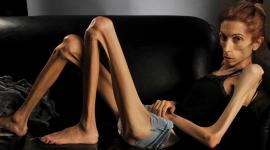Body-Image Distortion a Growing Problem Among Women and Men
Beauty, it is said, lies in the eye of the beholder.
But if the beholder has been bombarded by too much television and too many videos or reads too many fashion magazines, the eye may develop an unhealthy tunnel vision, experts say.
 "Body image is not just appearance," said Karen Ritter, a licensed clinical social worker with 18 years' experience. "Your body image has to do with your health, your various talents, how able you are to be in tune with sensations in your body."
"Body image is not just appearance," said Karen Ritter, a licensed clinical social worker with 18 years' experience. "Your body image has to do with your health, your various talents, how able you are to be in tune with sensations in your body."
Ritter is the clinical director of the Oak Knolls Family Therapy Center in California, which specializes in treating eating disorders in both sexes.
Many of us grow up in families watching people be critical of their bodies, Ritter said. But everyone's body has strengths and weaknesses, and bodies are tied to a person's genetics.
"White American women have the worst body-image distortion," Ritter said. "Black American women have the best body image."
But comparing your body with someone else's doesn't work, nor does the mirror give an accurate picture of what you look like, she said. "You need to be active and doing things with your body that help your body," she said. "And resist the pressure to judge yourself and others based on weight, shape or size."
The Centers for Disease Control and Prevention in Atlanta conducted a survey that found more than a third of girls considered themselves overweight, compared with fewer than 15 percent of the boys.
Other studies say about half of teen girls are dieting, and elementary school students are already worrying about weight. The results lend new meaning to the term "trying to fit in."
"How you perceive your body is only one component of a complete self-image, but too often it becomes the sole factor in determining self-esteem," say experts.
"When 'how-I-look' becomes more important than 'who-I-am,' the groundwork is laid for crippling and life-threatening eating disorders."
According to information from the National Women's Health Resource Center, "Our society's 'ideal' body size for a woman has decreased, and the difference between the size of the average American woman and the size many women think they should be has grown tremendously. Twenty years ago, for example, the average fashion model weighed 8 percent less than the average woman; today's models weigh 23 percent less."
More than 43 percent of the girls in one study said they were on a diet. The most common methods used were" skipping meals, taking diet pills and inducing vomiting after eating," the study said. Experts agree that trying to achieve the "perfect" female body image seen on TV and magazines is leading an increasing number of teens to develop eating disorders such as bulimia and anorexia nervosa.
Men aren't Immune to Body Image Problems
Increasing numbers of men are joining the ranks of those who are unhappy with their bodies, and many are abusing steroids in an effort to look more muscular and powerful.
In a special report in the March 2001 edition of the Psychiatric Times, called "Unraveling the Adonis Complex," Dr. Harrison G. Pope Jr. wrote, "Steroids have shattered a million-year-old equilibrium of nature by making it possible to create men far leaner and more muscular than any naturally occurring man. The images of these steroid-pumped bodies have propagated into advertising, television soap operas, professional wrestling shows, movies and magazine covers. Even action figures ---- the little plastic heroes used by young boys in play ---- now sport huge muscles in comparison to their counterparts of a generation earlier."
Pope is professor of psychiatry at Harvard Medical School and chief of the biological psychiatry laboratory at the McLean Hospital Alcohol and Drug Abuse Research Center in Belmont, Mass. The "Adonis complex" is a term coined by the doctor and his colleagues for "male body obsession," which they say is on the rise.
"Today's men should recognize that many of these muscled bodies are products of steroids and other drugs; they should also recognize that large industries profit by nurturing male body obsessions, just as similar industries prey on women," Pope wrote.
"Men should remember that muscularity is not masculinity, and that self-esteem is not built on a six-pack of abdominal muscles. Perhaps if we can help boys and men to rise above the messages of contemporary society and the media, they can regain the simple comfort with their bodies that previous generations took for granted."
Karen Ritter suggested that people should practice being nice to their bodies and respect themselves and others for reasons other than appearance.
"The keys to having a good body image are to treat your body with respect, give it enough rest, fuel it with a variety of foods, exercise, and resist the pressure to judge yourself and others based on weight, shape or size."
Negative body Image is ...
- A distorted perception of your shape ---- you perceive parts of your body unlike they really are
- You are convinced that only other people are attractive and that your body size or shape is a sign of personal failure.
- You feel ashamed, self-conscious and anxious about your body.
- You feel uncomfortable and awkward in your body.
Positive body Image is ...
A clear, true perception of your shape ---- you see various parts of your body as they really are.
- You celebrate and appreciate your natural body shape and you understand that a person's physical appearance says very little about their character and value as a person.
- You feel proud and accepting of your unique body and refuse to spend an unreasonable amount of time worrying about food, weight and calories.
- You feel comfortable and confident in your body.
next: Distorted Body Image Can Have Tragic Results
~ eating disorders library
~ all articles on eating disorders
APA Reference
Gluck, S.
(2008, December 10). Body-Image Distortion a Growing Problem Among Women and Men, HealthyPlace. Retrieved
on 2026, March 2 from https://www.healthyplace.com/eating-disorders/articles/body-image-distortion-a-growing-problem-among-women-and-men



